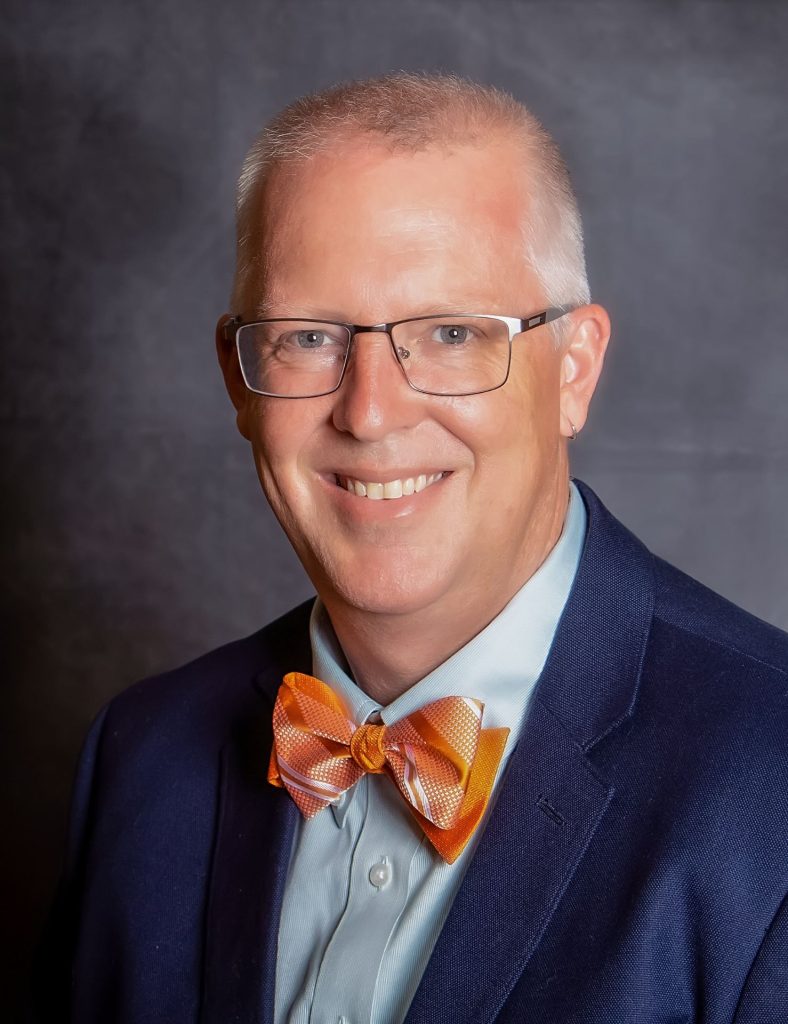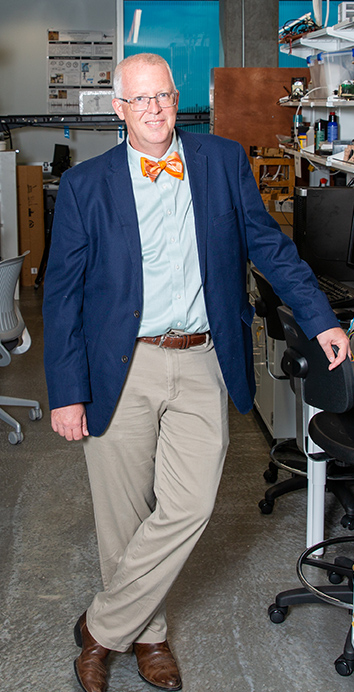

Dr. Joshua Summers
Career Highlights
Professional
Funded and consultant work by and for organization such as NASA, the National Science Foundation, U.S. Army TACOM (Tank-automotive and Armaments Command), BMW, The Michelin Group, General Motors, Wright Metal Products Crates, Hartness International, Environmental Corporation of America, Georgia Tech, Rockwell Automation Group, Workbench, among others
Fellow of ASME (American Society of Mechanical Engineers); Leader in the Computer and Information in Engineering Division and Design Engineering Division
Founding Member of the The Design Society, North American Chapter
Teaching
Advisor for four postdoctoral students; 15 PhD dissertations; 57 master’s theses; 12 master’s projects; 2 honor’s undergraduate theses
Former Students currently in academic positions at the Citadel, Clemson University, Florida Tech, James Madison University, St. Louis University, Texas State University, University of Georgia and University of Maryland
Scholarship
Holds more than 350 peer-reviewed publications (>100 journal articles; >220 conference papers) and four patents
Current associate editor of the Journal of Computing and Information Science in Engineering in topical area of computer-aided design and of Journal of Research in Engineering Design in topical area of human subject studies; editorial board member on Journal of Design Research, Journal of Computational Design and Engineering and Journal of Engineering Design
Recent Awards
Recipient of the ASME CIE (Computers and Information in Engineering) Excellence in Research Award; ASME Kos Ishii-Toshiba Award for research contributions to design for manufacturing and the life cycle; NASA JPL (Jet Propulsion Laboratory) Patent Award; SAE International Arch T. Colwell Merit Award; TMCE (Tools and Methods of Competitive Engineering) Outstanding Contribution Award; SAE International Ralph R. Teetor Educational Award; Innovision Award (Innovations in Education); South Carolina Governor’s Award for Scientific Awareness; numerous mentoring, teaching, advising and exceptional achievement awards from Clemson
Collaborative, Computational Design Leader Named Head of Mechanical Engineering
Dr. Joshua Summers, a leading engineer and researcher in the areas of collaborative and computational design and design education, is now head of the Department of Mechanical Engineering in the Erik Jonsson School of Engineering and Computer Science.
Summers was most recently professor of mechanical engineering and director of graduate studies at Clemson University, where he also directed or co-directed several research groups. His appointment at The University of Texas at Dallas began Jan. 1, 2021.
“Joshua is an international leader in engineering design, manufacturing and systems science who has demonstrated a strong commitment to diversity and to preparing the next generation of engineers and scientists, at all levels,” said Dr. Stephanie G. Adams, dean of the Jonsson School and holder of the Lars Magnus Ericsson Chair. “I am impressed by his knowledge of the field of mechanical engineering, his vision for the Department of Mechanical Engineering at UT Dallas, and his professional contributions to date.
“Under his leadership diversity, curricular innovations, faculty development, research expansion in new areas and industry relations will receive top priority. Joshua is a visionary leader who people want to follow. I believe he will be a tremendous asset to UT Dallas.”
Summers’ career includes nearly $20 million in funding from government agencies and large and small companies, appointments with federal research agencies and the office of an elected official, as well as accolades for mentoring, research, innovation and service. What Summers said is his greatest accomplishment is being the advisor on record for four postdoctoral students, 15 completed PhD dissertations, 57 master’s dissertations, 12 master’s degree projects and of two honors undergraduate student theses.
“I like helping people realize their best,” Summers said. “When my students walk across the stage at graduation or are hooded, that communicates that we accomplished and completed something, that they are now prepared to tackle the world.”
His motivation of seeing people aspire also applies to his new role in the Jonsson School as head of mechanical engineering. A dozen years old, the Department has been a major driver of rapid growth at UT Dallas, the second-fastest growing public doctoral university in the country, according to The Chronicle of Higher Education. In the last couple of years, the Department moved into a new four-story, 200,000-square-foot building of labs, classrooms and office space.
“The youth of the department is attractive because we have an opportunity to make an impact as we continue to grow our collaborative research culture,” Summers said. “Whereas student aspiration can culminate at graduation, for faculty members the comparable achievement would be attaining tenure and going through promotion.”
Student Centric
As director of graduate studies at Clemson from June 2014 until August 2019, Summers helped increase overall enrollment in the program by 40%, domestic student enrollment by 50%, and female enrollment by 30%; double underrepresented student enrollment; introduce online graduate courses; and establish a graduate student council, several new programs and courses, and a part-time graduate program for working professionals.
“Joshua is an international leader in engineering design, manufacturing and systems science who has demonstrated a strong commitment to diversity and to preparing the next generation of engineers and scientists, at all levels. I am impressed by his knowledge of the field of mechanical engineering, his vision for the Department of Mechanical Engineering at UT Dallas, and his professional contributions to date.”
Dr. Stephanie G. Adams
Jonsson School Dean and Lars Magnus Ericsson Chair
“Some faculty members only look for the ‘top student’ to start with, but then you don’t have as much of a chance to make a difference,” Summers said. “I enjoy working with students who may not necessarily even think that they have a shot at higher aspirations. I customize my approach to adapt to their needs, goals and hopes. This applies to faculty mentorship as well, and in the business world to clients.”
Summers’ takes a holistic approach to student success. At Clemson he instituted faculty life nights that provided opportunities for students to ask questions about life as a professor. Faculty members and program alumni held discussions with current students about different aspects of their profession. The program was so popular that students from Georgia Tech, Penn State University, the University of Nebraska and even institutions in Canada joined the sessions. In part because of such efforts, several of his former postdoctoral and doctoral students are in academic positions at universities such as University of Georgia, Saint Louis University, Florida Tech, the Citadel, James Madison University and the University of Maryland, as well as numerous students employed in industry jobs at small and large companies across the United States.
Research on Design, Complexity and Artificial Intelligence
On the research side, Summers’ areas of expertise are collaborative design, knowledge management, and design enabler development with the overall objective of improving design through collaboration and computation. One of the most enduring innovations from his lab is in the area of complexity.
His research group creates models that unpack the connections in what makes a topic complex. These models, made through computer-aided design or CAD, determine underlying characteristics of a complex issue, and then aggregate the findings to answer questions or make predictions about cost, time or whatever information the client needs to know using a new approach in artificial intelligence to make small data big.
“We’re mostly focused on connections,” Summers said. “The beautiful thing in engineering is that everything can be represented as a graph – nodes and arcs. These graphs can represent mathematical equations, flow charts, project plans, assemblies, cities – whatever is needed.”
Recent projects that his current and former students have worked on include testing how modeling behaviors change when engineers use a new CAD system to predict manufacturing costs in real time for an American-based global aerospace company; modeling and prediction of individual differences of associates, engineers and managers in accepting new automation in manufacturing; prediction about a new manufacturing process to determine if a major aircraft company is ready to implement such a change; and formal representation and reasoning on requirements, such as change prediction for U.S. Army ground vehicle systems.
Collaborators on his type of research come from computer science and mathematics, as well as from fields such as psychology and sociology.
At Clemson, Summers was education director of the Center for Advanced Manufacturing (CAM) that is in direct partnership with the THINKER program. Backed by a $3 million National Science Foundation (NSF) grant that Summers is the co-principal investigator of, THINKER is the first program in the nation to bring together graduate students and technical college students in an advanced manufacturing program centered on education and research. As education director of CAM, Summers also developed cross-disciplinary college level capstone opportunities and aligned various educational initiatives of the various CAM partner centers and research programs.
He also co-directed the CEDAR Group (Clemson Engineering Design Applications and Research), a collection of multiple faculty members and their students who are engaged in design research – understanding how people design, how teams design and developing tools to improve that.
“I don’t think simply designing something is ‘design research’,” Summers said. “I want to understand aspects of what went well, what didn’t go well, why did it not go well, so we are using CAD and artificial intelligence to ask and answer those types of questions.”
Modeling Service
Summers has also been active in advancing educational opportunities for women and other members of minority groups. As Special Assistant to the Dean for Minority and Academic Initiatives at Clemson University, Summers introduced regular discussions with alumni and graduate students aimed at retention of female and minority undergraduate students and their transitions into the workforce or graduate school. He also organized recruitment visits to Clemson of students from other colleges such as those that are majority-minority institutions, and served on the Clemson University Council for Diversity and Inclusion. He was selected as ambassador and executive mentor for Clemson University’s ADVANCE program, which is funded by the NSF for organizational change for gender equity in STEM academic professions.
Summers also provides service opportunities for his students. His volunteer initiatives aimed at introducing elementary, middle and high school students to engineering have been lauded at the highest levels of state government. For example, in 2012 he received the South Carolina Governor’s Award for Scientific Awareness for his elementary school outreach program in designing and building wind tunnels (about four dozen wind tunnels are now found in elementary schools in South Carolina). This was but one program Summers organized for his college students to serve and have experiences outside the classroom that they can recount later.
“From my point of view, mentoring is about trying to make sure everyone has as many stories as possible so that they can create their own path forward,” he said. “There is not one template for success. There are multiple paths forward but you don’t even know they are there unless someone tells you.
“As a new department head at UT Dallas, I look forward to helping open doors and letting Jonsson School students, faculty and staff members know about many opportunities to experience success.”

Academic Experience
Education
Bachelor’s and master’s degree in mechanical engineering from the University of Missouri, research on fluidized bed design and virtual reality-based early-stage submarine design, respectively; Phd in mechanical engineering from Arizona State University, research on design automation
Research Areas
Collaborative design, knowledge management, design enabler development with the overall objective of improving design through collaboration and computation
Appointments
Intern for VR Lab, Summer Faculty Fellow, Naval Center for Applied Research in Artificial Intelligence, Naval Research Laboratory; Intern, Foreign Relations/Armed Services Staff for former Senator John D. Ashcroft; Visiting Professor, Grenoble Institute of Technology; Adjunct Professor of Mechanical and Aerospace Engineering, West Virginia University; Professor of Mechanical Engineering, IDEaS (Innovation and Discovery in Engineering and Science) Professorship in College of Engineering and Science, Director of Graduate Studies, Director for Educational Initiatives for the Center for Advanced Manufacturing, Special Assistant to the Dean for Minority and Academic Initiatives, Clemson University